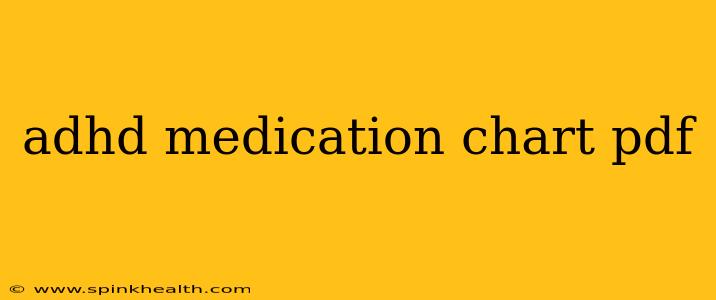Decoding the World of ADHD Medication: A Guide for Understanding Treatment Options
Navigating the landscape of ADHD medication can feel overwhelming. There's no single "best" medication, as the ideal choice depends heavily on individual factors like age, other health conditions, and response to treatment. This guide aims to shed light on common ADHD medications without providing specific medical advice or endorsing any particular drug. Always consult a qualified healthcare professional for personalized recommendations. This isn't a substitute for professional medical advice; it's intended for informational purposes only.
What are the common types of ADHD medication?
ADHD medications primarily fall into two categories: stimulants and non-stimulants. Imagine them as two different paths leading to the same destination – improved focus and attention.
Stimulants: These medications work by increasing the levels of dopamine and norepinephrine in the brain, neurotransmitters crucial for focus and attention. Common examples include methylphenidate (Ritalin, Concerta) and amphetamine (Adderall, Vyvanse). Think of them as carefully adjusting the brain's "volume control" for focus, turning down the noise and amplifying the signal.
Non-stimulants: These medications work differently, often affecting other neurotransmitter systems in the brain. A common example is atomoxetine (Strattera). They provide a gentler, more gradual approach to managing ADHD symptoms.
What are the side effects of ADHD medication?
Side effects vary greatly depending on the individual and the specific medication. Some common side effects of stimulants include:
- Decreased appetite: This is a frequent complaint, often leading to weight loss.
- Insomnia: Difficulty falling asleep or staying asleep is another common issue.
- Headaches: These can range from mild to severe.
- Stomach upset: Nausea or abdominal pain may occur.
- Increased heart rate: Some individuals experience a faster heartbeat.
Non-stimulants also have potential side effects, which may include:
- Nausea: This can be a significant issue for some individuals.
- Constipation: Difficulty with bowel movements is another possibility.
- Fatigue: Feeling tired or lacking energy.
- Dizziness: Lightheadedness can occur, especially when starting the medication.
- Decreased Libido: Some individuals report a reduced sex drive.
It's crucial to remember that this list isn't exhaustive, and the severity of side effects can vary considerably. Open communication with your doctor is paramount.
How long does it take for ADHD medication to work?
The onset of effects varies depending on the medication and individual response. Some stimulants, particularly those with immediate-release formulations, can start working within an hour. Others, such as extended-release versions, may take longer. Non-stimulants usually take several weeks to reach their full therapeutic effect.
Are there any long-term effects of ADHD medication?
Long-term studies on the effects of ADHD medication are ongoing, but current research suggests that the benefits typically outweigh the risks for many individuals. However, regular monitoring by a healthcare professional is essential to assess for any potential long-term side effects and adjust treatment as needed.
What are the different types of formulations available?
ADHD medications are available in various formulations, including:
- Immediate-release: These medications release their active ingredients quickly, providing a shorter duration of action.
- Extended-release: These medications release their active ingredients more slowly, providing a longer duration of action, often lasting 8-12 hours or longer.
- Patches: Some medications are available as transdermal patches, providing a slow, steady release of medication through the skin.
The choice of formulation depends on individual needs and preferences, and your doctor will help determine the best option for you.
Can adults with ADHD take the same medication as children?
While many of the same medications are used for both children and adults with ADHD, dosages and formulations may differ. Adult considerations, such as potential interactions with other medications and the presence of comorbidities, significantly influence the choice and dosage of medication. Adults and children require tailored treatment plans.
This information is for educational purposes only and should not be considered medical advice. Always consult with a healthcare professional to discuss ADHD medication and determine the best treatment plan for your individual needs. They can help you weigh the benefits and risks, monitor for side effects, and make adjustments as necessary. Remember, finding the right medication and dosage is often a process of trial and error, and patience is key.

